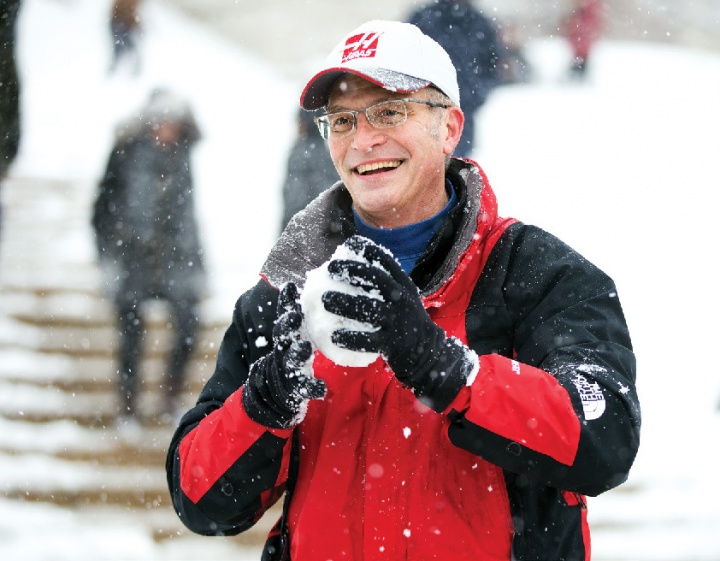Columbia College | Columbia University in the City of New York
Our Community’s Highest Priority
In early February we had a snow day on campus. Classes were canceled and nearly a foot of snow fell in New York City. I surprised students by joining a snowball fight on Low Plaza, while Dean’s Offce staff served hot chocolate in Hamilton Hall. It was an unexpected opportunity for us to come together as a community.

MICHAEL EDMONSON ’20
I’ve been thinking about that snowball fight lately because we have been very focused on campus wellness this semester. The Oxford English Dictionary defines wellness as “the state or condition of being in good physical, mental, and spiritual health, especially as an actively pursued goal.” That’s what our students seemed to feel during the snowball fight, and something they tell me they want more of in their day-to-day lives.
The essential goal of higher education is to prepare students for life after graduation. At Columbia College, we do this on a variety of levels, from offering a dynamic curriculum and extracurricular activities, to providing faculty the resources they need to best educate students, to facilitating student success through enhanced career advising and student wellness programs.
While we have had a strong support system in place for many years — including professional Residential Life staff and student RAs in all of our residence halls; academic, study abroad, fellowship, nancial aid and student organization advisers; and access to University resources such as Columbia Health and Counseling and Psychological Services — we have been working to enhance and expand support for student health and well-being.
In Fall 2016, we created a director of wellness position to support the undergraduate community’s priorities. In recent years, we have improved our Medical Leave of Absence Policy and have expanded support for first-generation and low-income students and other communities.
Recently, we augmented staff training for recognizing and responding to student mental health emergencies, retrained student-facing College staff and are now training all College staff (including me). We also plan in the coming months to train Core instructors, directors of undergraduate studies and student leaders.
As we work on these initiatives, I have been grateful for our students, alumni and parents, who have offered their time and thoughts as part of this conversation. Students have written op-eds and articles, told me about formal and informal initiatives that they have started on campus to support fellow students and volunteered to represent the College at the 2nd Annual Ivy League Mental Health Conference, which was hosted at Brown in February.
We also recently organized a community roundtable with student leaders and College staff to brainstorm ways to reduce the pressure that students feel. Ideas included adding mental health programming to the New Student Orientation Program and adding more small-scale opportunities for “fun,” such as movies, concerts or games on campus.
After the roundtable, I asked students why the snowball fight was such a special experience. One student said: “We know that every Columbia student is incredibly intelligent and takes very intense academic courses. So it’s easy for us to forget that every Columbia student is also still a kid who enjoys snowball fights, loves to watch movies with friends on Low Steps, is excited by the idea of receiving free Columbia stickers and wants to take pictures with Roar-ee to put on their Instagram.”
While we are focused on educating students for their lives after graduation, we also need to remember that they are kids, young people who are still developing the tools they need to succeed, personally and professionally. And though we cannot solve all of the problems that students face on- and off-campus, there are steps we can take as a community to instill a greater sense of health and well-being.
We are now making student well-being our highest priority, and we will continue to look at ways to address stress and to enhance student resources. We are committed to providing Columbia College students with health and wellness tools that will serve them not only while they are here, but also for many years to come.

Dean
Issue Contents
Published three times a year by Columbia College for alumni, students, faculty, parents and friends.
Columbia Alumni Center
622 W. 113th St., MC 4530, 6th Fl.
New York, NY 10025
212-851-7852
cct@columbia.edu
Columbia Alumni Center
622 W. 113th St., MC 4530, 4th Fl.
New York, NY 10025
212-851-7488
ccalumni@columbia.edu

